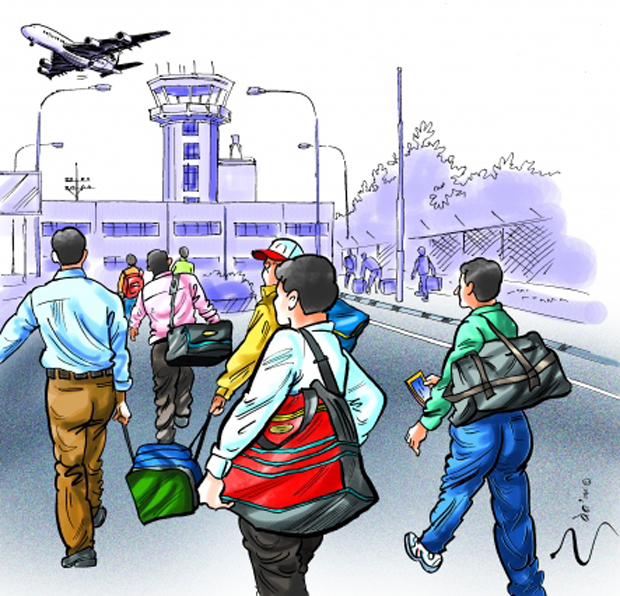बैदेशिक रोजगारमा जाने कामदारले जान्नै पर्ने कुराहरु
- केही सीप सिकेर, आफूले गर्ने, गर्न सक्ने र जान्ने कामका वारेमा, पाउने तलवका वारेमा राम्ररी जानी बुझी मात्र जानु पर्दछ ।
- लाग्ने खर्च, प्राप्त हुने आम्दानीका वारेमा तुलनागरि लाभ हुने काममा मात्र जानु पर्दछ।
- घर परिवारसँग सल्लाह, परामर्श गरी सहमतिमा मात्र जानु पर्दछ ।
- बैदेशिक रोजगार बिभागवाट श्रम स्वीकृति लिएर मात्र बैदेशिक रोजगारमा जानु पर्दछ ।
बैदेशिक रोजगारमा जाँदा दुर्घटनामा परी मृत्यू वा अंगभंग हुन सक्दछ । विमा गर्दा कामदारलाई र उस्को परिवारलाई आर्थिक सहयोग प्राप्त हुन्छ । - बैदेशिक रोजगारमा जाँदा विस्वासिलो र भरपर्दो मेनपावर कम्पनी मार्फ जानु पर्छ । व्यवसायिक वा Visitभिसामा जानु हुदैन । जानी जानी गलत कागजात बनाई जानु हुँदैन ।
- घर परिवारसँग सल्लाह गरि मानसिक रुपमा तयार हुनु पर्दछ ।
- बैदेशिक रोजगारमा जानका लागि पैसा बुझाएपछि व्यहोरा खुलाई भरपाई लिनु पर्दछ । कति खर्च लाग्छ राम्ररी बुझनु पर्छ । कुनै एजेन्ट वा कम्पनीले भरपाई दिन आनाकानी गरेमा ठगिकै नियत भएको बुझ्नु पर्छ ।
- स्वदेशी विमानस्थलवाट मात्र जानु पर्दछ । अन्य छिमेकी देशको बाटो गरेर जानु हुँदैन । बेचिन वा ठगीमा पर्न सकिन्छ ।
- आफू जाने देशको भौगोलिक स्थिति, हावापानी रहन, सहन, धर्म, कानून, काम गर्ने वातावरण आदि वारेमा सामान्य जानकारी लिनु पर्छ । यस्का लागि पूर्व प्रस्थान अभिमूखीकरण तालीम अनिवार्य रुपमा लिनु पर्दछ ।
- बैदेशिक रोजगारमा जाँदा आवश्यक सवै कागजातहरुको एक एक प्रति आफू र परिवारको साथमा राख्नु पर्छ ।
बैदेशिक रोजगारको क्रममा ठगिमा परे बैदेशिक रोजगार बिभागमा उजुरी गर्नु पर्दछ । - बैदेशिक रोजगार सम्वन्धी कुनै पनि सूचना जानकारीका वारेमा बुझ्नु परेमा बैदेशिक रोजगार बिभाग र बैदेशिक रोजगार प्रवर्द्धन वोर्डको सचिवालयको ठेगानामा सर्म्पर्क गरी बुझ्न सकिन्छ ।
आम संचार माध्यमले प्रकाशन गरेको बैदेशिक रोजगारको सूचना/ विज्ञापन सहि भए नभएको बुझ्नु पर्दछ । गलत विज्ञापन गरी पैसा उर्ठाई ठगि गर्न सक्दछन । - सरकारले निषेध गरेको देशमा र काममा जानु हुदैन ।
बैदेशिक रोजगारका लागि गएका कामदारले ध्यान दिनु पर्ने कुराहरु
- काम गर्न जाने मूलुकको नेपाली राजदूतावास, श्रम सहचारी, संघ गैर आवासीय नेपाली एवं नेपाली संघ संस्था आदिको सर्म्पर्क ठेगाना फोन आफ्नो साथमा राख्नु पर्छ
- अप्ठ्यारो र कठीनाई पर्दा सर्म्पर्क गर्न सजिलो हुन्छ
- बिदेशमा रहदा नेपाली राजदूतावास, नेपाली संघसंस्था र आफ्नो घर परिवारको नियमित सर्म्पर्कमा रहनु पर्दछ । यसो गर्दा अप्ठारो पर्दा उद्धार गर्न सजिलो हुन्छ । मानसिक तनाव न्यून गर्न सकिन्छ ।
- काम गरिरहेको वा काम गर्न गएको कम्पनी छोडी अन्यत्र काम गर्न जानु हुदैन । कतिपय देशमा यस्तो गरेमा गैर कानूनी भइन्छ, जेल सजाय पनि हुन सक्दछ ।
- करार अवधि सकिएपछि स्वदेश फर्किएर पुन बीमा गराई श्रम स्वीकृति लिएर जानु पर्छ, अन्यथा दुर्घटना पर्दा बीमा र अन्य आर्थिक सहायताको सुविधा पाइदैन ।
- सम्झौता गरेको भन्दा फरक कम्पनीमा, फरक काममा, कम पारिश्रमिकमा काम लगाएको छ भने तुरुन्त नेपाली दूतावास, बैदेशिक रोजगार बिभागमा उजुरी गर्नु पर्छ । आफू खुसी अन्यत्र काम गर्न जानु हुँदैन ।
- कोठामा बस्दा वा सुत्दा ए.सी.को सही किसिमवाट प्रयोग गर्नु पर्दछ । थाहा नभएको काम कुरा सिकेर जानेर मात्र गर्नु पर्दछ ।
- कमाएको पैसाको फजुल खर्च गर्नु हुंदैन, बचाएको पैसा बैंकिङ्ग च्यानलवाट पठाउनु पर्छ, व्यक्तिगत तवरवाट र हुण्डीवाट पठाउदा जोखिम -खतरा) हुन्छ ।
- आफ्नो स्वास्थ्य र क्षमताको ख्याल गरेर काम गर्नुपर्छ, क्षमता भन्दा बढी ओभरटाइम काम गर्नु हुंदैन ।
- खास गरी खाडि मुलुकमा जाँदा पान मसाला, पराग, मर्चा तथा अन्य सुर्तिजन्य पदार्थ, मदिरा लैजान र र्सार्वजनिक स्थानमा प्रयोग गर्न प्रतिवन्ध छ । यस्ता सामान लुकाई लगेमा, विक्रि गरेमा वा प्रयोग गरेमा कडा सजाय हुन्छ । जाँड रक्सी र लागू पदार्थ जस्ता कुलतमा लाग्नु हुँदैन ।
- सम्वन्धित मुलुकको, कम्पनीको नियमको पालना गर्नु पर्छ, अरुको धर्म संस्कृतिको सम्मान गर्नु पर्दछ । अनावश्यक झै झगडा र अरुको उक्साहटमा हडतालमा उत्रनु हुँदैन ।
- सम्वन्धित देशको ट्राफिक नियम वुझ्ने र पालना गर्नु पर्दछ ।










